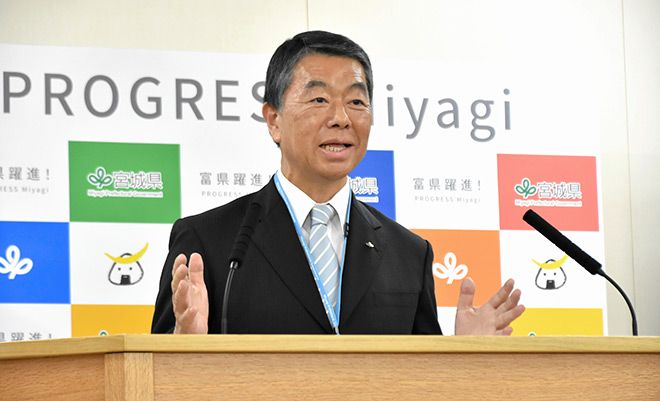Listen to the article
Miyagi Governor Proposes Fact-Checking Body After Election Misinformation Campaign
Newly re-elected Miyagi Governor Yoshihiro Murai has announced plans to establish a fact-checking organization following what he described as a targeted misinformation campaign during his recent election. The six-term governor’s initiative aims to combat the spread of false information online, but experts warn the proposal raises serious concerns about government overreach and potential threats to freedom of expression.
During the October 26 gubernatorial race, social media platforms were flooded with misleading claims about Murai’s policy positions. Among the most prominent falsehoods was the assertion that he supported a private mega-solar project—a venture he has explicitly opposed. The spread of such misinformation prompted Murai to take action.
“I suffered from false information during the election campaign,” Murai stated at a news conference on October 27. He revealed that he had directed senior prefectural officials to explore creating an organization that would “conduct fact-checks from a third-party standpoint.”
When questioned about the independence of such an organization at a subsequent press conference on November 5, Murai attempted to distance himself from its development. “I am staying away from it; officials are discussing it while consulting with various parties, such as lawyers and the prefectural police,” he explained. The governor acknowledged concerns about potential abuse of administrative power, saying he wants to “consider it carefully.” He added that if the prefecture ultimately finds the task too challenging, he would appeal to the national government instead.
The governor’s proposal comes amid growing national debate about online misinformation. Japan’s communications ministry has been examining countermeasures through an expert panel. When “promoting fact-checking” appeared in the panel’s draft recommendations in September, it sparked immediate pushback over concerns about government-led verification efforts. The final document explicitly stated that “the independence of fact-checking organizations from government, public institutions and other bodies should be ensured.”
Political parties across Japan have increasingly embraced fact-checking initiatives of their own. Osaka Ishin no Kai launched a “Fact-checker” social media account in 2021 that targeted posts critical of the party and its COVID-19 response policies. Komeito introduced “AI fact-checker” software ahead of Tokyo’s metropolitan assembly election this year, while the Democratic Party for the People offered “Policy fact-checks” on its website during the July Upper House election. Japan’s ruling Liberal Democratic Party has announced plans to “establish a system to conduct fact-checking on a routine basis” to counter opposition claims and online misinformation.
These partisan fact-checking efforts have drawn criticism from independent verification organizations. The nonprofit FactCheck Initiative Japan (FIJ) issued a statement arguing that “the use of the term ‘fact-checking’ by political parties goes against internationally established principles.” FIJ cited the International Fact-Checking Network’s principles of “non-partisanship and fairness,” suggesting political fact-checking “should be clearly distinguished from third-party fact-checking.”
Despite Murai’s assurances that his proposed organization would operate from a “third-party, neutral standpoint,” experts remain skeptical. Shiro Segawa, project professor at the University of Tokyo and FIJ chairman, warned that prefecture involvement would inevitably compromise independence. “As long as the prefecture is involved in its establishment, even if it is in the form of outsourcing, the prefecture’s intentions can easily influence it. Its independence and third-party nature would be deemed low,” he explained.
Constitutional law expert Kenta Yamada of Senshu University offered a more fundamental critique. “Fact-checking is not something that public institutions or politicians should be doing in the first place,” he said. “Public authorities are the target of fact-checking. If they become the ones doing the checking and deciding what is correct or incorrect, it could lead to the manipulation of information.”
Yamada also expressed concern about potential enforcement mechanisms, warning that deleting content deemed incorrect or imposing penalties on those who post it “would endanger freedom of expression.”
As Japan grapples with the global challenge of online misinformation, Miyagi Prefecture’s proposed solution highlights the delicate balance between combating falsehoods and preserving democratic freedoms—a dilemma facing democracies worldwide in the digital age.
Fact Checker
Verify the accuracy of this article using The Disinformation Commission analysis and real-time sources.




9 Comments
Curious to learn more about the specific plans for this fact-checking body. Independence and clear methodology will be key. Glad to see efforts to address online misinformation, but the devil is in the details.
An interesting approach, but a lot will depend on the specifics. Fact-checking can be a powerful tool, but it’s crucial that the process is transparent, impartial and not subject to political interference.
Agreed. The credibility of the fact-checkers and the integrity of the process will be critical to the success of this initiative.
Misleading claims on social media are a growing challenge. Governor’s proposal could help address this, but safeguards must be in place. Public trust will be critical for the success of this fact-checking effort.
Agreed, transparency and accountability will be essential. Need to see details on the proposed structure and process.
Combating misinformation is important, but this proposal raises valid concerns. Need to ensure any fact-checking body maintains true independence and doesn’t become a tool for government censorship or control.
This is a complex issue with valid concerns on both sides. Fact-checking can combat misinformation, but risks of government control are real. Hope to see a balanced approach that respects free speech while restoring public trust.
Fact-checking is important, but I share concerns about government overreach. Need to ensure this initiative doesn’t infringe on freedom of expression. Balanced, transparent approach is key.
Interesting initiative to combat misinformation. Fact-checking can be a powerful tool, but it’s crucial that any oversight body maintain true independence and neutrality. Curious to see how this proposal is structured and implemented.